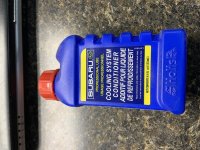I havre a late 90s Crown Vic and its been a reliable car with no major issues. I don't drive the car too much and it has relatively low miles, 82K. It lives the garage the majority of the time. Really, the only problems I've had were a fuel pump going bad and coil packs. The fuel pump wasn't too bad.
I keep up the maintenance, so the last time I took the car for an oil change at the dealer about two months ago, there weren't any major issues - of course they wanted to up-sell me all kinds work, but that's another story.
Last week, I noticed a coolant smell and then a small puddle under the car at back of the engine. I checked all the usual suspects, heater hoses, etc, and I couldn't find it. Then I went on YouTube to find other culprits. Apparently, there are known coolant issues with the 4.6L.
Long story short, the intake manifold needs to come off and a gasket set will, hopefully take care of the problem. I'm happy to say that my long time friend, a former Ford master tech, confirmed my initial diagnosis! Thanks Youtube!
It doesn't look too bad, but I'm debating doing it myself or paying him to do it...
I keep up the maintenance, so the last time I took the car for an oil change at the dealer about two months ago, there weren't any major issues - of course they wanted to up-sell me all kinds work, but that's another story.
Last week, I noticed a coolant smell and then a small puddle under the car at back of the engine. I checked all the usual suspects, heater hoses, etc, and I couldn't find it. Then I went on YouTube to find other culprits. Apparently, there are known coolant issues with the 4.6L.
Long story short, the intake manifold needs to come off and a gasket set will, hopefully take care of the problem. I'm happy to say that my long time friend, a former Ford master tech, confirmed my initial diagnosis! Thanks Youtube!
It doesn't look too bad, but I'm debating doing it myself or paying him to do it...

